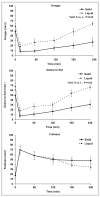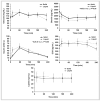Effects of solid versus liquid meal-replacement products of similar energy content on hunger, satiety, and appetite-regulating hormones in older adults
- PMID: 17533583
- PMCID: PMC2197163
- DOI: 10.1055/s-2007-976545
Effects of solid versus liquid meal-replacement products of similar energy content on hunger, satiety, and appetite-regulating hormones in older adults
Abstract
Objective: To examine whether solid versus liquid meal-replacement products differentially affect appetite and appetite-regulating hormones in older adults.
Methods: On two occasions, 9 subjects (age: 61+/-3 years; BMI: 25.6+/-1.3 kg/m (2)) consumed 25% of daily energy needs as solid or liquid meal-replacements of similar energy contents. Blood and appetite ratings were collected over 4 hours.
Results: The post-prandial hunger composite (area under the curve) was lower following the solid versus liquid meal-replacement (p<0.005) and remained below baseline over 4 hours (p<0.05). Similar responses were observed with the desire to eat. The insulin and ghrelin composites were lower following the solid trial compared to the liquid [insulin: 5825 (range: 4676-11639) VS. 7170 (4472-14169) uIU/l x 240 min, p<0.01; ghrelin: -92798 (range: -269130-47528) VS. -56152 (range: -390855-30840) pg/ml x 240 min, p<0.05]. Ghrelin also remained below baseline over 4 hours (p<0.05). No differences in cholecystokinin and leptin were observed between products.
Conclusion: The consumption of comparable meal-replacement products in solid versus liquid versions with similar energy contents led to differential appetitive responses and should not be viewed as dietary equivalents in older adults.
Figures


Similar articles
-
Liquid and solid meal replacement products differentially affect postprandial appetite and food intake in older adults.J Am Diet Assoc. 2008 Jul;108(7):1226-30. doi: 10.1016/j.jada.2008.04.014. J Am Diet Assoc. 2008. PMID: 18589034 Free PMC article. Clinical Trial.
-
Food form and portion size affect postprandial appetite sensations and hormonal responses in healthy, nonobese, older adults.Obesity (Silver Spring). 2010 Feb;18(2):293-9. doi: 10.1038/oby.2009.217. Epub 2009 Jul 23. Obesity (Silver Spring). 2010. PMID: 19629055 Free PMC article. Clinical Trial.
-
Appetite, food intake, and plasma concentrations of cholecystokinin, ghrelin, and other gastrointestinal hormones in undernourished older women and well-nourished young and older women.J Clin Endocrinol Metab. 2003 Aug;88(8):3747-55. doi: 10.1210/jc.2002-021656. J Clin Endocrinol Metab. 2003. PMID: 12915664 Clinical Trial.
-
Is glycemic index of food a feasible predictor of appetite, hunger, and satiety?J Nutr Sci Vitaminol (Tokyo). 2009 Jun;55(3):201-7. doi: 10.3177/jnsv.55.201. J Nutr Sci Vitaminol (Tokyo). 2009. PMID: 19602827 Review.
-
Peripheral regulation of food intake: new insights.J Endocrinol Invest. 2004 Jan;27(1):96-8. doi: 10.1007/BF03350918. J Endocrinol Invest. 2004. PMID: 15053251 Review.
Cited by
-
The Acute Effects of Breakfast Drinks with Varying Protein and Energy Contents on Appetite and Free-Living Energy Intake in UK Older Adults.Geriatrics (Basel). 2022 Jan 30;7(1):16. doi: 10.3390/geriatrics7010016. Geriatrics (Basel). 2022. PMID: 35200521 Free PMC article.
-
Effects of food form on food intake and postprandial appetite sensations, glucose and endocrine responses, and energy expenditure in resistance trained v. sedentary older adults.Br J Nutr. 2011 Oct;106(7):1107-16. doi: 10.1017/S0007114511001310. Epub 2011 Apr 15. Br J Nutr. 2011. PMID: 21492495 Free PMC article. Clinical Trial.
-
A protein-rich beverage consumed as a breakfast meal leads to weaker appetitive and dietary responses v. a protein-rich solid breakfast meal in adolescents.Br J Nutr. 2011 Jul;106(1):37-41. doi: 10.1017/S0007114511000122. Epub 2011 Feb 15. Br J Nutr. 2011. PMID: 21320368 Free PMC article.
-
Will reducing sugar-sweetened beverage consumption reduce obesity? Evidence supporting conjecture is strong, but evidence when testing effect is weak.Obes Rev. 2013 Aug;14(8):620-33. doi: 10.1111/obr.12048. Epub 2013 Jun 7. Obes Rev. 2013. PMID: 23742715 Free PMC article.
-
Consuming Almonds vs. Isoenergetic Baked Food Does Not Differentially Influence Postprandial Appetite or Neural Reward Responses to Visual Food Stimuli.Nutrients. 2017 Jul 27;9(8):807. doi: 10.3390/nu9080807. Nutrients. 2017. PMID: 28749419 Free PMC article. Clinical Trial.
References
-
- Flegal KM, Carroll MD, Kuczmarski RJ, Johnson CL. Overweight and obesity in the United States: prevalence and trends, 1960–1994. Int J Obes Relat Metab Disord. 1998;22:39–47. - PubMed
-
- MacIntosh C, Morley JE, Chapman IM. The anorexia of aging. Nutrition. 2000;16:983–995. - PubMed
-
- Ogden CL, Carroll MD, Curtin LR, McDowell MA, Tabak CJ, Flegal KM. Prevalence of overweight and obesity in the United States, 1999–2004. JAMA. 2006;295:1549–1555. - PubMed
-
- Yeh SS, Schuster MW. Geriatric cachexia: the role of cytokines. Am J Clin Nutr. 1999;70:183–197. - PubMed
-
- Heymsfield SB, van Mierlo CA, van der Knaap HC, Heo M, Frier HI. Weight management using a meal replacement strategy: meta and pooling analysis from six studies. Int J Obes Relat Metab Disord. 2003;27:537–549. - PubMed
Publication types
MeSH terms
Substances
Grants and funding
LinkOut - more resources
Full Text Sources

